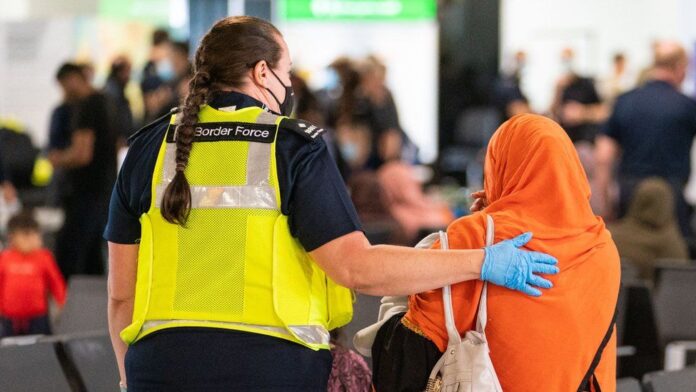LONDON: The British government has been told to act as “a matter of urgency” to offer vulnerable Afghans at risk of persecution safe and legal ways to reach the UK.
In a joint letter penned on Monday, 23 non-governmental organizations, including the British Red Cross and Refugee Council, expressed “grave concern” at London’s failure to open safe and legal routes for vulnerable people still in Afghanistan, more than half a year since Kabul fell.
The Afghan Citizens’ Resettlement Scheme was announced on Aug. 18 with British Prime Minister Boris Johnson pledging that it would resettle up to 20,000 of the most vulnerable people at risk in the country, with around 5,000 arrivals expected in the first year.
Many Afghans who worked with NATO forces as interpreters or in other functions are in danger of reprisals by the Taliban for their cooperation.
Around 14,000 of those people and their families were evacuated in August, and approximately 2,000 more have been brought out since then.
The ACRS opened in January, but, in their joint letter, the NGOs warned that in reality the scheme offered “little or no capacity for those most at risk in Afghanistan to come to the UK in a safe and secure manner.”
The failure was due, in part, to government-imposed limits on who could be directly relocated from Afghanistan in the first year.
Only those who “supported the UK and international community effort in Afghanistan, including those British Council and GardaWorld contractors and Chevening alumni who are most at risk” are allowed.
But this, the NGOs — also including Oxfam UK and Refugee Action — said, left thousands of vulnerable Afghans with the “invidious choice” of remaining in Afghanistan at risk of persecution, fleeing into a neighboring country such as Pakistan in the hope of being able to access the UN High Commissioner for Refugees referral pathway, or embarking on even more dangerous journeys further afield.
They also voiced concern that those who had managed to make it out of Afghanistan were struggling to reunite with their families.
The joint letter added: “Many of our organizations have been involved in delivering practical and emotional support to people evacuated to the UK, many of whom are suffering from trauma and high levels of anxiety about family and friends left behind in Afghanistan.
“Many of these people are anxious to hear further details of when the scheme would open, how it would operate, and whether friends and family would be eligible to come to the UK under the ACRS.”

